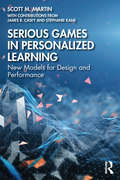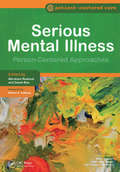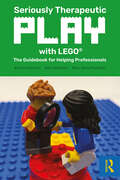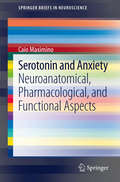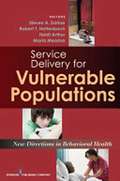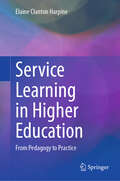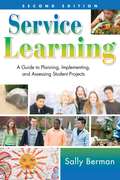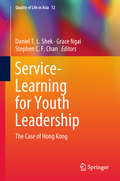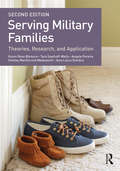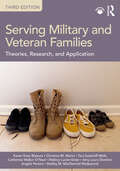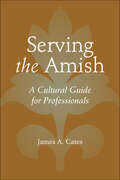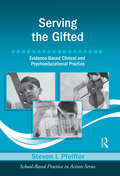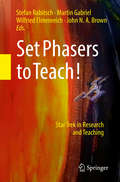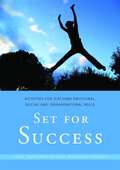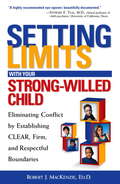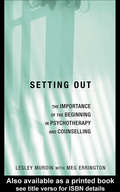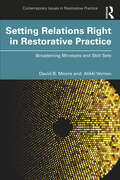- Table View
- List View
Serial Killers: Shocking, Gripping True Crime Stories of the Most Evil Murderers
by Brian InnesThe Terrifying Story of the Most Monstrous Serial Killers through History.Serial Killers are the most notorious and disturbing of all criminals, representing the very darkest side of humanity. Yet they endlessy fascinate and continue to capture the public's attention with their strange charisma and deadly deeds. From Jack the Ripper to Ted Bundy and the Moors Murderers Ian Brady and Myra Hindley, these killers transfix us with their ability to commit utterly savage acts of cruelty and depravity. Only with modern police detection methods and psychological profiling, have these figures that have existed throughout human history finally been identified in the deadliest category: serial killers. These methods, the killers' characters and their crimes are described here in fascinating and terrifyingly gripping detail. The whole history of serial killers is brought to life in 50 chapters, including:Herman Webster Mudget, Devil in the White CityJohn Christie, 10 Rillington Place murdersZodiac KillerIan Brady and Myra Hindley, The Moors MurderersTed BundyFred and Rosemary WestJeffrey DahmerAileen WuornosHarold Shipman, Dr Death (P)2017 WF Howes Ltd
Serious Games in Personalized Learning: New Models for Design and Performance
by Stephanie Kane Scott M. Martin James R. CaseySerious Games in Personalized Learning investigates game-based teaching and learning at a time when learning and training systems are increasingly integrating serious games, machine-learning artificial intelligence models, and adaptive technologies. Game-based education provides rare data for measuring, assessing, and evaluating not just a game’s effectiveness but the acquisition of information and knowledge that a student may gain through playing a learning game. This book synthesizes contemporary research, frameworks, and models centered on the design and delivery of serious games that truly personalize the learning experience. Scholars of educational technology, instructional design, human performance, and more will find a comprehensive guide to the history, practical implications, and data-collection potential inherent to these fast-evolving tools.
Serious Mental Illness: Person-Centered Approaches
by David Roe Abraham RudnickPractical and evidence-based, this unique book is the first comprehensive text focused on person-centered approaches to people with serious mental illness such as schizophrenia and bipolar disorder. It reflects a range of views and findings regarding assessment, treatment, rehabilitation, self-help, policy-making, education and research. It is highly recommended for all healthcare professionals, students, researchers and educators involved in general practice, psychiatry, nursing, social work, clinical psychology and therapy. Healthcare service providers, and policy makers and shapers, will find the book's wide-ranging, multi-professional approach enlightening. 'Serious Mental Illness reflects a continued distancing from the outmoded and unsubstantiated belief that people with severe mental illnesses could not recover, and that they would respond positively only to goals and treatment plans chosen, designed and implemented by providers in order to prevent their further deterioration. Anyone with an interest in the concept of person-centered approaches will discover new ideas in this book. Indeed, anyone with an interest in person-centered approaches has to read this book. Not only is it the first such book on person-centered approaches, but it will serve as the gold standard in this topic area for years to come.' William A Anthony, in the Foreword
Seriously Mad: Mental Distress and the Broadway Musical
by Aleksei GrinenkoTheatermakers in the United States have long been drawn to madness as a source of dramatic spectacle. During the Broadway musical’s golden age in the mid-twentieth century, creative teams used the currently in-vogue psychoanalytic ideas about mental life to construct troubled characters at odds with themselves and their worlds. As the clinical and cultural profile of madness transformed over the twentieth century, musicals continued to delve into the experience of those living with mental pain, trauma, and unhappiness. Seriously Mad offers a dynamic account of stage musicals’ engagement with historically significant theories about mental distress, illness, disability, and human variance in the United States. By exploring who is considered mad and what constitutes madness at different moments in U.S. history, Aleksei Grinenko shows how, in attempts to bring the musicals closer to highbrow sophistication, theater dramatized serious medical conditions and social problems. Among the many Broadway productions discussed are Next to Normal, A Strange Loop, Sweeney Todd, Man of La Mancha, Gypsy, Oklahoma!, and Lady in the Dark.
Seriously Not All Right: Five Wars in Ten Years
by Ron CappsFor more than a decade, Ron Capps, serving as both a senior military intelligence officer and as a Foreign Service officer for the U.S. Department of State, was witness to war crimes, ethnic cleansing, and genocide. From government atrocities in Kosovo, to the brutal cruelties perpetrated in several conflicts in central Africa, the wars in both Aghanistan and Iraq, and culminating in genocide in Darfur, Ron acted as an intelligence collector and reporter but was diplomatically restrained from taking preventative action in these conflicts. The cumulative effect of these experiences, combined with the helplessness of his role as an observer, propelled him into a deep depression and a long bout with PTSD, which nearly caused him to take his own life. Seriously Not All Right is a memoir that provides a unique perspective of a professional military officer and diplomat who suffered (and continues to suffer) from PTSD. His story, and that of his recovery and his newfound role as founder and teacher of the Veterans Writing Project, is an inspiration and a sobering reminder of the cost of all wars, particularly those that appeared in the media and to the general public as merely sidelines in the unfolding drama of world events.
Seriously Therapeutic Play with LEGO®: The Guidebook for Helping Professionals
by Kristen Klassen Alec Hamilton Mary Anne PeabodyLEGO® bricks are a staple in many child and play therapists’ offices, and Seriously Therapeutic Play with LEGO® shows therapists and counselors how to integrate LEGO® in a therapeutically valuable way. This book presents a therapeutic approach based in biological, psychological, and social research, one that supports participants as they build models that represent their thoughts, emotions, experiences, and reflections. Using a variety of evidence-based intervention techniques, chapters show clinicians how to incorporate the model and associated metaphors to help clients, and they do so in a way that is compatible with any number of therapeutic orientations or perspectives. Though based in current research, Seriously Therapeutic Play with LEGO® is designed for psychologists, social workers, school counselors, occupational therapists, clinical educators and supervisors, coaches, support workers, and other health care providers across the lifespan who wish to use play therapeutically.
Seriously Therapeutic Play with LEGO®: The Guidebook for Helping Professionals
by Kristen Klassen Alec Hamilton Mary Anne Peabody• There is a dearth of research regarding use of LEGO® in therapy and this manuscript presents the foundational response to that gap.• Most available approaches to using LEGO® in therapy are prescriptive and directive; this book presents an innovative, responsive, and dynamic approach to the use of LEGO®.• Practitioner-focused, presenting practical information and relevant vignettes that can be readily implemented in therapy.
Serotonin and Anxiety
by Caio MaximinoAnxiety disorders have long been a research subject for scientists in different areas of inquiry, and the particular role of serotonin - the neurotransmitter which has probably most captured the imagination of laymen and academics alike - is as elusive as the clinical aspects of serotonergic medications. Why are drugs acting at certain serotonin receptors efficacious against generalized anxiety disorder, but not panic disorder? Why is the inverse true for monoamine oxidase inhibitors? These clinically relevant issues are clarified by the neurochemical, anatomical and physiological organization of the serotonergic system. In this book, the author summarizes the latest findings regarding the role of serotonin in modulating the activity of brain regions which organize behavioral patterns associated with fear, anxiety and stress. The emergent picture is one of far greater complexity than previously thought: while the serotonergic innervation of those brain regions arises from the same structure - the dorsal raphe nucleus - that structure is not homogeneous from anatomical, physiological and neurochemical points of view, nor are its projections to the cerebral aversive and behavioral inhibition systems. The diverse findings which compose this picture of complexity - whether they arise from developmental neurobiology, electrophysiology, neurochemistry, neuroendocrinology, neuropsychopharmacology or behavioral neuroscience - are integrated in this book. Advanced undergraduate, graduate students, and researchers will benefit from the information. The result sheds light on many important questions regarding the neuroanatomical, pharmacological and functional aspects of the role of serotonin in anxiety disorders, and points to future avenues of research.
Serpent in the Garden: Amish Sexuality in a Changing World
by James A. CatesThe first book to examine the complexity of sexual identity, philosophy, and behavior in Amish culture.The Amish offer a startling contrast to the postmodern view of sexuality and gender roles. After the sexual revolution of the 1960s, mainstream American culture never looked back. Meanwhile, the Amish never looked forward. In twenty-first-century Amish communities, heteronormative sexuality is still based on a unifying principle: an understanding of sexuality as emerging from a divine plan. In the eyes of the Amish, sex is squandered by those who embrace it as hedonistic or who carve out a sexual identity that moves them away from that singular, God-given purpose. But this communal emphasis on sex for procreation does not mean that the Amish do not possess a complex range of sexual identities and opinions.In Serpent in the Garden, clinical psychologist James A. Cates breaks new ground in the study of Amish sexuality by examining this shrouded, rarely discussed subject. The first book to bring Amish sexuality into primary focus, this volume argues that, because the Amish are a sexual minority, queer theory is the ideal framework from which to observe their views on sex, sexuality, and gender. The book offers a broad view of sexuality in Amish culture that includes the challenges that gays and lesbians face in the community, as well as an exploration of Amish gender roles, their views toward intimacy, their responses to cases of child sexual abuse, and the role of fetishes among the Amish. Cates draws from multiple perspectives and years of research on the Amish themselves. He also looks at pushback against alternative behaviors or identities, as well as Amish success in keeping mainstream values at bay. With this book, Cates establishes Amish sexuality as a topic worthy of professional attention. Offering readers a more sophisticated understanding of the Amish and of sexual expression among cultures, Serpent in the Garden will appeal to scholars working on gender and sexuality, the Amish, and social service professionals who serve the Amish community.
Service Delivery For Vulnerable Populations: New Directions In Behavioral Health
by Steven Estrine[This book] provides a comprehensive understanding of the opportunities for all of us working with vulnerable populations to develop thoughtful, workable programs. The topics presented are not limited to the severely mentally ill, but it is an encyclopedia of resources and creative options for service to veterans, the homeless, the elderly. This book challenges us to think creatively and develop programs and services for the people in our society who are most often overlooked and forgotten.
Service Learning in Higher Education: From Pedagogy to Practice
by Elaine Clanton HarpineThis practical guide assists university faculty in developing and implementing service-learning courses and projects across multiple disciplines. It examines how embedding academic service-learning projects into the core curricula benefits not only the students, but also their universities and communities. The book describes ways in which service learning becomes a powerful teaching method using step-by-step explanations, real-world examples, and instructor checklists and handouts. Chapters detail how to integrate academic service-learning projects into classroom pedagogy and evaluate student experience.Key areas of coverage include:Strategies for ensuring that students engage with academic service-learning projects from the initial stages through completion.Guidance on embedding an academic service-learning curriculum into traditional coursework to supplement students’ textbook knowledge and classroom experiences to address real-world problems in the community.Research confirming the ways in which students learn more and score higher on end-of-the-semester tests when courses incorporate academic service-learning projects.Steps to incorporate service-learning projects across various disciplines and coursework to enrich student learning and produce positive outcomes for universities and communities. Service Learning in Higher Education is an essential resource for professors and graduate students as well as teachers and educational professionals in such varied fields as school and clinical child psychology, educational psychology, social work, pedagogy, educational practice and policy, sociology, anthropology, and all related disciplines.
Service Learning: A Guide to Planning, Implementing, and Assessing Student Projects
by Sally BermanService learning offers students the unique opportunity to learn both in the classroom and in the real world. This exciting teaching strategy, detailed in Berman’s second edition of Service Learning, motivates students to learn content information, processes, and skills while making authentic connections to their surrounding community. This valuable resource explains the benefits of service learning and provides a step-by-step guide for using the instructional model. It features nine service-learning projects that are broken down into basic, intermediate, and advanced levels. Each project features: - Strategies for aligning service and curricular goals - Tips for involving students in decision-making - Guidelines for managing different phases of the project - Activities that foster reflection and self-evaluation - Tips for differentiating by tapping into multiple intelligences In this single resource, teachers will find everything they need to successfully implement service learning projects, helping students gain deeper understandings of content while positively impacting their communities.
Service-Learning for Youth Leadership: The Case Of Hong Kong (Quality of Life in Asia #12)
by Daniel T. L. Shek Grace Ngai Stephen C. F. ChanThis book examines service-learning – a valuable means of promoting civic engagement and youth leadership in students by enabling them to apply their knowledge to needy people in the community. It describes selected service-learning projects in different areas by highlighting the subjects being offered, service site(s), completed service projects, evaluation findings and teachers’ reflections. Although service-learning has increased tremendously in the West, its development in different Chinese societies is still in its infancy. As such, this book provides valuable insights on the implementation and future directions of the service-learning movement in China by documenting lessons learned and sharing success stories. It also discusses related evaluation findings and impacts on students to show that service-learning can increase students’ empathy, social awareness, social responsibility and psychosocial skills and as a result can improve their quality of life. In addition, the book highlights how service-learning activities promote the well-being of the clients and communities being served. It also stimulates thinking and sharpens the thoughts of educators, administrators and those who wish to promote the quality of life of students and service recipients through service-learning.
Serving Military Families: Theories, Research, and Application (Textbooks in Family Studies)
by Amy Laura Dombro Shelley Macdermid Wadsworth Angela Pereira Karen Rose Blaisure Tara Saathoff-WellsThis text introduces readers to the unique culture of military families, their resilience, and the challenges of military life. Personal stories from nearly 70 active duty, reservists, veterans, and their families from all branches and ranks of the military bring their experiences to life. A review of the latest research, theories, policies, and programs better prepares readers for understanding and working with military families. Objectives, key terms, tables, figures, summaries, and exercises, including web based exercises, serve as a chapter review. The book concludes with a glossary. Readers learn about diverse careers within which they can make important differences for families. Engaging vignettes are featured throughout: Voices from the Frontline offer personal accounts of issues faced by actual program leaders, practitioners, researchers, policy makers, service members, veterans, and their families. Spotlight on Research highlights the latest studies on dealing with combat related issues. Best Practices review the optimal strategies used in the field. Tips from the Frontline offer suggestions from experienced personnel. Updated throughout including the latest demographic data, the new edition also features: -New chapter (9) on women service members that addresses the accomplishments and challenges faced by this population including sexual bias and assault, and combat-related psychological disorders. - New chapter (10) on veterans and families looks at veterans by era (e.g.WW2), each era's signature issues and how those impact programs and policies, and challenges veterans may face such as employment, education, and mental and physical health issues. -Two new more comprehensive and cohesive chapters (11 & 12) review military and civilian programs, policies, and organizations that support military and veteran families. -Additional information on TBI and PTSD, the deployment cycle, stress and resilience, the possible negative effects of military life on families, same-sex couples and their children, and the recent increase in suicides in the military. -More applied cases and exercises that focus on providing services to military families. Intended as a text for advanced undergraduate or graduate courses on military families or as a supplement for courses on the family, marriage and family, stress and coping, or family systems taught in family science, human development, clinical or counseling psychology, sociology, social work, and nursing, this book also appeals to helping professionals who work with military and veteran families.
Serving Military and Veteran Families: Theories, Research, and Application
by Amy Laura Dombro Karen Rose Blaisure Tara Saathoff-Wells Catherine Walker O’Neal Christina M. Marini Mallory Lucier-Greer Colonel Angela Pereira Shelley M. MacDermid WadsworthServing Military and Veteran Families introduces readers to the unique culture of military families, their resilience, and the challenges of military life. It reviews the latest research, theories, policies, and programs to prepare readers for understanding and working with military and veteran families. It also offers practical knowledge about the challenges that come with military family life and the federal policies, laws, and programs that support military and veteran families. Boasting a new full-color design and rich with pedagogy, the text also includes several boxed elements in each chapter. "Spotlight on Research" highlights researchers who study military and veteran families with the goal of informing and enriching the work of family support professionals. "Voices from the Frontline" presents the real-life stories of support program leaders, practitioners, researchers, policymakers, and most importantly service members and veterans and their families. "Tips from the Frontline" offers concrete, hands-on suggestions based on the experiences and wisdom of the people featured in the text and the broader research and practice communities. Third Edition features: Streamlined focus on theories and the addition of the contextual model of family stress and life course theory, including an interview with Glen Elder in which he shares his perspective on the development of life course theory and how it can be applied to understand development across individuals and cohorts. Personal accounts of 70 program leaders, practitioners, researchers, policymakers, and, significantly, service members, veterans, and family members who offer insight into their personal experiences, successes, and challenges associated with military life. 20 new interviews with service members, veterans, family members, researchers, and clinicians that bring important topics to life. Updated demographics and descriptions of service members, veterans, and their families. Expanded descriptions of mental health treatment approaches with an emphasis on including family members. Updated exercises focused on providing services to military and veteran families. New online resources designed to further enrich discourse and discussion. Serving Military and Veteran Families is designed as a core text for advanced undergraduate or graduate courses on military and veteran families, or as a supplement for related courses taught in family science, human development, family life education, social work, and clinical or counseling psychology programs. Providing a foundation for working with increased sensitivity, knowledge, and respect, the text can also be a useful resource for helping professionals who work with military and veteran families.
Serving the Amish: A Cultural Guide for Professionals (Young Center Books in Anabaptist and Pietist Studies)
by James A. CatesThe first comprehensive cultural guide for professionals who interact with Amish individuals and communities.Serving the Amish is a targeted guide for professionals who care for or interact with Plain people: doctors, nurses, law enforcement officers, judges, social workers, psychotherapists, and addiction counselors, among others. For these professionals, knowing the "what" of Amish life is not enough. They must go deeper, understanding the "why"—the ideologies that both drive and bind this community in a system of beliefs that seems alien to those who embrace the technological and social turbulence of the twenty-first century. James A. Cates draws heavily on his experiences as a clinical psychologist in private practice in northeastern Indiana, a region that is home to more than 35,000 Amish people. He combines anecdotal evidence and first-person narrative to shed light on the social, emotional, and psychological foundations of Amish life to help professionals interact competently and build rapport with Amish clients. He also explains the unique challenges outsiders face in offering aid to a people whose lifestyle and rules dictate a distance from all things worldly. This practical book balances evidence-based principles of care with an emphasis on reducing anxiety and establishing warm relationships. From the police officer dispersing a party full of Amish Youngie to the social worker staffing a child protective services hotline, professionals who work with the Amish will benefit from this one-of-a-kind guide.
Serving the Gifted: Evidence-Based Clinical and Psychoeducational Practice (School-Based Practice in Action)
by Steven I. PfeifferDesigned for practitioners who work with the gifted, this volume is intended to serve as a practical and easy-to-use resource for working with gifted students, their teachers, and their parents and families. It provides timely, practical, evidence-based techniques and guidelines to help these practitioners better help an underserved group. The book is written in a user-friendly style that makes this a quick, simple, and easy reference. Topics covered include identification and assessment of gifted students; important information for understanding the needs of the gifted; counseling and psychotherapy strategies; career counseling for gifted and talented students; methods for working with the families of the gifted; and legally-correct and ethically-smart counseling techniques. An accompanying CD will contain valuable resources such as PowerPoint presentations and reproducible handouts and forms.
Set Boundaries, Find Peace: A Guide to Reclaiming Yourself
by Nedra Glover TawwabTHE NEW YORK TIMES BESTSELLEREnd the struggle, speak up for what you need, and experience the freedom of being truly yourself.Healthy boundaries. We all know we should have them in order to achieve work/life balance, cope with toxic people, and enjoy rewarding relationships with partners, friends, and family. But what do "healthy boundaries" really mean - and how can we successfully express our needs, say "no," and be assertive without offending others?Licensed counselor, sought-after relationship expert, and one of the most influential therapists on Instagram Nedra Glover Tawwab demystifies this complex topic for today's world. In a relatable and inclusive tone, Set Boundaries, Find Peace presents simple-yet-powerful ways to establish healthy boundaries in all aspects of life. Rooted in the latest research and best practices used in cognitive behavioral therapy (CBT), these techniques help us identify and express our needs clearly and without apology - and unravel a root problem behind codependency, power struggles, anxiety, depression, burnout, and more.
Set Boundaries, Find Peace: A Guide to Reclaiming Yourself
by Nedra Glover TawwabTHE NEW YORK TIMES BESTSELLEREnd the struggle, speak up for what you need, and experience the freedom of being truly yourself.Healthy boundaries. We all know we should have them in order to achieve work/life balance, cope with toxic people, and enjoy rewarding relationships with partners, friends, and family. But what do "healthy boundaries" really mean - and how can we successfully express our needs, say "no," and be assertive without offending others?Licensed counselor, sought-after relationship expert, and one of the most influential therapists on Instagram Nedra Glover Tawwab demystifies this complex topic for today's world. In a relatable and inclusive tone, Set Boundaries, Find Peace presents simple-yet-powerful ways to establish healthy boundaries in all aspects of life. Rooted in the latest research and best practices used in cognitive behavioral therapy (CBT), these techniques help us identify and express our needs clearly and without apology - and unravel a root problem behind codependency, power struggles, anxiety, depression, burnout, and more.
Set Phasers to Teach!: Star Trek in Research and Teaching
by Wilfried Elmenreich John N.A. Brown Stefan Rabitsch Martin GabrielFor 50 years, Star Trek has been an inspiration to its fans around the world, helping them to dream of a better future. This inspiration has entered our culture and helped to shape much of the technology of the early 21st Century.The contributors to this volume are researchers and teachers in a wide variety of disciplines; from Astrophysics to Ethnology, from English and History to Medicine and Video Games, and from American Studies to the study of Collective Computing Systems. What the authors have in common is that some version of Star Trek has inspired them, not only in their dreams of what may be, but in the ways in which they work - and teach others to work - here in the real world. Introduced with references to Star Trek films and television shows, and illustrated with original cartoons, each of the 15 chapters included in this volume provides insights into research and teaching in this range of academic fields.
Set for Success
by Josie Santomauro Margaret Anne CarterTo be successful in today's world, all children need to become competent in emotional, social and organisational skills. This book of easy-to-implement strategies will be an invaluable tool for teaching these essential life skills to children of all abilities. Each chapter provides objectives, lesson ideas, activities and photocopiable worksheets, and adopts an engaging theme appealing to a wide range of interests including science, music, cookery and sports. From developing organisational skills by making use of timetables, reports and note-taking, to promoting self-esteem by creating acrostic poems, Set for Success offers a series of structured yet fun-filled exercises that cater for all learning styles and levels of emotional and social proficiency. This practical resource is ideal for children aged 3-10, and the activities can be easily adapted for older children who need extra support in developing emotional, social and organisational skills.
Setting Limits with Your Strong-Willed Child
by Robert J. MackenzieNow You Can Effectively Parent Your Strong-Willed ChildDoes your child constantly misbehave and ignore or refuse your requests for proper behavior? Is your relationship with your child based on conflict instead of mutual respect and cooperation? With the help of this groundbreaking book, you can create a positive, respectful, and rewarding relationship with your child.Inside are proven techniques and procedures that provide a refreshing alternative to the ineffective extremes of punishment and permissiveness. Parents and teachers alike will discover how to effectively motivate the strong-willed child and achieve proper conduct. You will learn how to:·Understand and empathize without giving in ·Hold your ground without threatening ·Remove daily power struggles between you and your child ·Give clear, firm messages that your child understands and respects ·And much more!"Eminently useful and readable! This book should be a part of every parent's and school's reference library." --Judy E. Hunt-Brown, principal, Elk Grove Unified School District"A grand book that teaches everybody in the family new skills and encourages more peaceful, socially acceptable lives at home, school, in the office, or in any social group." --Barbara O'Donnell, principal, St. Francis Elementary School"A highly recommended eye-opener; beautifully documented." --Stewart E. Teal, M.D., clinical professor of child psychiatry, University of California, DavisFrom the Trade Paperback edition.
Setting Limits with Your Strong-Willed Child
by Robert J. MackenzieIn this fully revised and expanded second edition, Setting Limits author Robert MacKenzie is back with even more time-proven methods for dealing with misbehavior and creating positive, respectful, and rewarding relationships with children prone to acting out and disobedience.Disruptive misbehavior, constant power struggles, manipulative or aggressive behavior--the challenges facing parents and teachers of strong-willed children can seem overwhelming at times. That's why thousands of parents and educators have turned to the solutions in Setting Limits With Your Strong-Willed Child. This revised and expanded second edition offers the most up-to-date alternatives to punishment and permissiveness--moving beyond traditional methods that wear you down and get you nowhere, and zeroing in on what really works so parents can use their energy in more efficient and productive ways. With fully updated guidelines on parenting tools like "logical consequences," and examples drawn directly from the modern world that children deal with each day, this is an invaluable resource for anyone wondering how to effectively motivate strong-willed children and instill proper conduct.From the Trade Paperback edition.
Setting Out: The Importance of the Beginning in Psychotherapy and Counselling
by Lesley Murdin Meg ErringtonThe nature and the outcome of therapy are always to some extent determined by the way the therapist decides to conduct the initial session. In Setting Out Lesley Murdin and Meg Errington explore the issues surrounding this subject, providing valuable insights into the significance of beginnings in psychotherapy. The book deals with practical issues for the therapist, such as the responsibility for the unfolding of the therapeutic relationship. It also addresses ethical and technical debates over how much should be said at the initial meeting, and how the beginning can determine the outcome. Subjects covered include: *The birth of a narrative self *Diagnosis: should we even begin? *Expectations: the birth of pattern recognition *Transference: the birth of the problem of reality Illustrated throughout with case vignettes, this exploration of the crucial issue of how to manage beginnings will be prove an invaluable resource for students of counselling and psychotherapy as well as experienced practitioners.
Setting Relations Right in Restorative Practice: Broadening Mindsets and Skill Sets (Contemporary Issues in Restorative Practice)
by David B. Moore Alikki VernonSetting Relations Right in Restorative Practice is a practical guide to using restorative processes, both in justice systems, to provide a healing response to harm, and in broader community contexts, to help people co-exist peacefully. Restorative processes can help to establish, maintain, deepen, and repair relationships, and to neutralise the conflict associated with negative relationships. The result is less conflict within people, between people, and between groups, and increasing individual and community wellbeing. These complex goals can be distilled to the single principle of setting relations right. The authors distil lessons from their decades of work at the frontline of restorative innovation. They outline an accurate, accessible theory that informs a restorative mindset, and describe in detail the corresponding skill set. Succinct, engaging case studies include refinements to existing programs in justice systems. Other case studies include the innovations of restorative responses to institutional abuse and to family violence and sexual harm, initiatives to increase psychological safety in schools and workplaces, and programs that support restorative ways-of-working across whole cities or regions. By applying elements from successful programs, practitioners can realise the broader reforming potential of restorative practice. This book is essential reading for restorative practitioners, administrators, and policymakers, for students and researchers – indeed, for anyone interested in the power and potential of restorative practice and other forms of deliberative decision-making.

